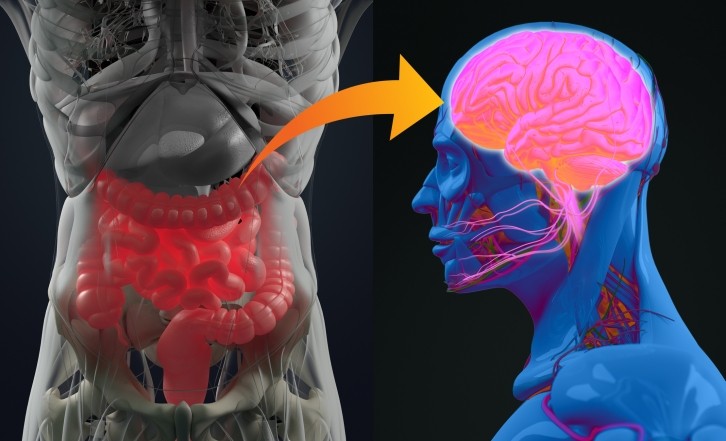Study: HMO and chicory root fibre impact mood via microbiome modulation

Conducted by researchers from Beneo and the University of Reading, the study found the chicory root supplement, with or without the human milk oligosaccharide, led to a significant increase in Bifidobacterium, Bacteroides, Roseburia and Faecalibacterium prausnitzii, compared to the control group, in a population of 92 healthy adults with mild to moderate feelings of anxiety and depression.
Additionally, supplemented participants significantly outperformed the control group in improvements in several mood state parameters.
Commenting on the findings, Dr Stephan Theis, Head of Nutrition Science at Beneo said: “Thanks to this study, an important piece of scientific evidence has been contributed to the fascinating science of the gut-brain-axis. The results add to the growing body of evidence showing that the composition of gut microbiota and resulting metabolites impact mood state.
"The findings also demonstrate that targeted influence with prebiotics may be a viable way to improve mood. It is notable that oligofructose has once again been shown to have a significant effect on beneficial microbiota and is an essential contributor to the beneficial effects on gut microbiota and mood parameters when combined with 2’fucosyllactose.”
Background
Beneo’s prebiotic chicory root fibre, Orafti Oligofructose, is said to support a healthy gut microbiota by selectively promoting the growth of beneficial microorganisms, such as Bifidobacteria, in the gut.
Anxiety and depression are the 2 biggest mental health disorders recorded worldwide. Although the mechanisms by which anxiety and depression are regulated are not well understood, there is increasing interest in the bidirectional relationship between the gut and the brain, aka the gut-brain axis.
Within the gut, several genera and species of bacteria can produce several metabolites associated with cognitive state including several neurotransmitters such as γ-aminobutyric acid (GABA), serotonin, and dopamine, as well as short-chain fatty acids (SCFAs) such as acetate, propionate, and butyrate.
SCFAs produced via saccharolytic fermentation play a role in neurotransmitter production, act as endocrine signalling molecules, reduce neuroinflammation via modulation of proinflammatory cytokines, and regulate the expression of GABA receptors, enterochromaffin cells, and brain-derived neurotrophic factor and glial-derived neurotrophic factor.
To date, the ability of prebiotics to improve mood state is still unclear, with studies producing mixed results. The authors of the current study suggest that one area frequently overlooked in such studies is microbial composition.
Therefore the objective of this double-blind, randomised, placebo-controlled trial, was to investigate the effects of OF and 2’FL, alone and in combination, on microbial load and composition as a primary outcome.
As secondary outcomes, the authors investigated whether OF and 2’FL could improve scores of the Beck Depression Inventory (BDI), State Trait Anxiety Inventory Y1 and Y2 (STAI Y1 and Y2), Positive and Negative Affect Schedule – Short Form (PANAS-SF), and Pittsburgh Sleep Quality Index (PSQI).
Saliva and urine samples were collected to assess changes in cortisol awakening response (CAR) and urinary metabolites in adults with mild-to-moderate levels of anxiety and depression.
The study
The study, which ran over five weeks (1 week run-in and 4 weeks intervention), aimed to look at the effect of the chicory root fibre oligofructose and the human milk oligosaccharide 2’fucosyllactose on intestinal colonisation and their ability to reduce anxiety and depression.
Using a randomised, double blind, placebo-controlled, parallel study, the subjects were split into four groups of 23 and given either 8g of oligofructose plus 2g of maltodextrin per day (OF), 8g of oligofructose plus 2g of 2’fucosyllactose per day, 2g of 2’fucosyllactose plus 8g of maltodextrin per day, or 10g of maltodextrin per day.
Changes in microbial load (fluorescence in situ hybridization-flow cytometry) and composition (16S ribosomal RNA sequencing) were the primary outcomes. Secondary outcomes included gastrointestinal sensations, bowel habits, and mood state parameters.
Large differences in microbial responses were seen between the four different interventions, with OF displaying the largest increases in microbial load in a number of different bacterial groups including Bifidobacterium, Bacteroides, and Faecalibacterium prausnitzii.
The data also suggested a link between microbiome changes and mood scores.
The report states: "We observed several significant correlations between bacterial taxa, namely Bifidobacterium, Roseburia, Anaerostipes, Blautia, and Faecalibacterium prausnitzii, and improvements in anxiety, depression, PA and NA scores, PSQI, and CAR values.
"On this basis, one could hypothesize that targeted manipulation of the gut microbiota could have a profound effect on mood state and sleep quality via regulations of neurological, immunological, or endocrine pathways."
Discussing the potential mechanism of action behind the mood improvements, the researchers hypothesise that the increases in several SCFA-producing bacteria (Bifidobacterium, Roseburia, Lachnospiraceae, and Faecalibacterium prausnitzii) likely led to increases in SCFA production.
The report states: "Increased SCFA production may have beneficial effects on mood state as SCFAs play vital roles in the regulation of neurotransmitter production and reduction in inflammatory responses via modulation of anti- and proinflammatory cytokines (IL-6, TNF-α, and IL-1β) and can act as endocrine signaling molecules.
"Additionally, propionate can protect against lipopolysaccharide-mediated blood brain barrier disruption, whereas butyrate has been associated with decreased histone acetylation. Furthermore, lower levels of SCFAs have been detected in depressed individuals and nonhuman primate models, whereas higher SCFA concentrations were associated with improved BDI scores.
"Moreover, in male adults, consumption of either low-dose SCFAs or high-dose SCFAs compared with placebo resulted in significant reductions in salivary cortisol response. It has also been suggested that SCFAs play a role in regulation of circadian rhythm."
Noting potential study limitations, the researchers acknowledge that they chose not to measure SCFAs in faeces and this could have potentially provided greater insights into differences in microbial responses between interventions and effects on microbial composition and mood state.
While care was taken in correcting for multiple comparisons, they note that the testing of multiple secondary outcomes can result in the increased risk of generating and accepting type 1 errors.
Finally, they acknowledge that correlation does not always equal causation, and "due care must be taken in the interpretation of these findings".
The authors conclude: "This is the first study to demonstrate that consumption of the prebiotic OF and prebiotic candidate 2’FL alone and in combination can result in substantial improvements in mood as reflected in BDI, STAI Y1 and Y2, and PANAS-SF scores and CAR. We can also conclude that OF induced substantial changes in microbial composition, especially increasing numbers of Bifidobacterium, Roseburia, Faecalibacterium, and Prevotella.
"The changes recorded in bacterial taxa correlated with those seen in several mood state parameters. In contrast, supplementation with 2’FL was unable to match OF in terms of changes in microbial composition due to the large heterogeneity seen between individuals. Future studies are needed to identify individual microbial responses to 2’FL supplementation."
Source: The American Journal of Clinical Nutrition
DOI: https://doi.org/10.1016/j.ajcnut.2023.08.016
"Inulin-type fructans and 2’fucosyllactose alter both microbial composition and appear to alleviate stress-induced mood state in a working population compared to placebo (maltodextrin): the EFFICAD Trial, a randomized, controlled trial"
Authors: Jackson PPJ,Wijeyesekera A, Williams CM, Theis S, van Harsselaar J, Rastall RA, (2023)












